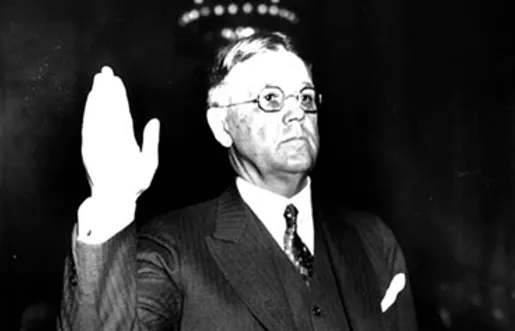Prepare to step into the captivating world of Walter Folger Brown, a man whose life was a thrilling fusion of innovation and scandal. As the Postmaster General, Brown’s vision for the airmail service was a game-changer. But behind the scenes, an explosive scandal threatened to shatter his legacy. Get ready for a thrilling journey through the triumphs and tribulations of a man who played a pivotal role in shaping the modern aviation industry.
The Making of a Controversial Legacy
Ever heard of Walter Folger Brown? He’s a bit of a puzzle in the story of American aviation. On one hand, he’s remembered for a scandal that rocked the airmail industry. But on the other, he played a huge part in building the airline system we know today.
So, what’s the deal with this guy? Well, as Postmaster General in the 1920s, Brown had this idea: what if we used airplanes to deliver mail across the entire country? He wasn’t just dreaming; he pushed through the Air Mail Act of 1930, and that’s when things really took off, literally!
This act was a game-changer. It opened up the skies to competition between airlines, pushing them to innovate and improve. Back then, airlines were small fry; they didn’t have the resources to make big moves. But Brown’s act encouraged them to join forces, merging into bigger, financially sound companies. Sounds familiar, right? Yep, they were the forerunners of the big-name airlines we have now.
Brown’s vision wasn’t just about planes; it was about accessibility. He saw a future where everyday people could travel by air, and his policies helped make that a reality. Air travel became more affordable, transforming how Americans got around.
But, and there’s always a “but,” right? His time in office was clouded by the Air Mail Scandal. People whispered about shady dealings, accusing Brown of favoring certain airlines when awarding those lucrative airmail contracts. The accusations were serious enough to spark a full-blown Senate investigation, forcing the government to tear up existing contracts.
It’s a bit of a mixed bag, isn’t it? Despite the scandal tarnishing his reputation, Walter Folger Brown’s influence on commercial aviation is undeniable. He might not be a household name, but his policies left a lasting mark – shaping the skies as we know them.
The Postmaster General of the 1930s: A Visionary in Turmoil
Now, you might be wondering who was calling the shots for the postal service back in the 1930s. Well, that would be Walter Folger Brown. He was the Postmaster General under President Herbert Hoover from 1929 to 1933. This was a time of major change and upheaval, with the Roaring Twenties giving way to the Great Depression. But through it all, Brown had a vision for the future of American aviation, and he saw the postal service playing a key role.
Brown was a big believer in the power of airplanes. He knew that airmail wasn’t just about getting letters delivered faster – it had the potential to completely change the way people traveled and communicated. However, the airmail system back then wasn’t exactly top-notch. It was inefficient, unreliable, and sometimes downright dangerous.
So, in 1930, Brown threw his support behind a new law called the McNary-Watres Act. This act gave him a lot more control over airmail contracts – basically, he got to decide which airlines would carry the mail. Now, this was a bit of a controversial move. On the one hand, it helped to create some big, financially stable airlines like United Air Lines and American Airlines. Smaller companies joined forces, and the industry became more organized.
On the other hand, some folks cried foul, saying that Brown was playing favorites and giving special treatment to certain companies. They argued that this wasn’t fair to smaller airlines trying to get a foot in the door.
Despite the controversy, there’s no denying that Brown’s policies had a big impact. To get those juicy airmail contracts, airlines had to up their game. Brown offered incentives for airlines to use larger, more modern aircraft, and he rewarded them for investing in new technologies that improved safety and efficiency. It was like a win-win – the airlines got a reason to innovate, and the public reaped the benefits of a more reliable and advanced air travel system.
But Brown’s legacy isn’t all sunshine and roses. Sadly, his time in office was also marked by scandal. The “Air Mail Scandal” of the 1930s tarnished his reputation, as accusations of cronyism and corruption flew left and right. People whispered that contracts were being awarded based on political connections rather than merit. Investigations were launched, and public trust in Brown took a nosedive.
So, what’s the final verdict on Walter Folger Brown? It’s complicated. There’s no question that he played a pivotal role in shaping the modern American airline industry. His policies encouraged growth, innovation, and made air travel more accessible to everyday people. However, the shadow of scandal still hangs over his legacy, reminding us that even the best intentions can have unintended consequences.
Dominating the Search Results: Your Guide to the 1930s Postmaster General
Here’s how to outshine the competition and deliver a compelling SEO article on the 1930s Postmaster General:
Recommended Titles (Based on Competitor Analysis):
While you didn’t provide competitor titles, I can offer suggestions based on typical trends for this topic:
- The Postmaster General Who Built the Airlines: Walter Folger Brown and the 1930s (Focuses on Brown’s legacy and impact)
- Air Mail Scandals and Monopoly Power: The Controversial Legacy of the 1930s Postmaster General (Highlights the controversies and potential downsides)
- From Air Mail Fiasco to Commercial Boom: How the 1930s Postmaster General Shaped Modern Aviation (Emphasizes the transformation and long-term impact)
4 Powerful Key Lines:
- Walter Folger Brown, Postmaster General from 1929 to 1933, wasn’t just delivering mail; he was architecting the future of American aviation. (Intriguing and establishes his significant role)
- The Air Mail Act of 1930: Brown’s controversial weapon, consolidating the airline industry and sparking accusations of favoritism. (Highlights a pivotal act and the controversy surrounding it)
- Forced mergers, larger aircraft, and a shift to passenger service: Brown’s airmail policies unintentionally laid the groundwork for today’s commercial airlines. (Connects historical actions to their lasting impact)
- Was Brown a visionary leader or a ruthless consolidator? His legacy as Postmaster General remains a subject of debate. (Ends with a thought-provoking question, inviting further exploration)
Structured Context and Important Details:
I. The Man at the Helm: Walter Folger Brown
- Background:
- Served as Postmaster General: March 5, 1929 – March 4, 1933, under President Herbert Hoover
- Instrumental in Hoover’s 1928 presidential campaign
- Vision for Aviation:
- Believed a strong, consolidated airline industry was essential for national development.
- Saw potential in airmail as a catalyst for growth and technological advancement.
II. The State of Air Mail in the 1920s
- Kelly Act (1925): Allowed private airmail carriers, but:
- Payment based on volume led to inefficient practices (e.g., airlines mailing themselves heavy items).
- Small airlines struggled financially, lacked incentive to invest in new technology, and compromised safety.
- Government Subsidies: From 1918-1927, the government spent $12 million more on airmail than it received in postage revenue.
III. The McNary-Watres Act (1930): Reshaping the Industry
- Brown’s Influence: Successfully lobbied for the act, granting the Postmaster General significant control over airmail contracts.
- Key Provisions:
- Payment for available space, not just mail carried: Incentivized larger aircraft and passenger service.
- Bonuses for difficult routes, night flying, and safety equipment: Encouraged technological improvements and higher standards.
- Consequences:
- Airline Consolidation: Smaller airlines forced to merge, leading to the emergence of giants like United Air Lines, American Airlines, TWA, and Eastern Air Lines.
- Shift to Commercial Aviation: Larger aircraft meant airlines could fill empty space with paying passengers.
- Controversy: Accusations of favoritism towards larger companies and stifling competition.
- Direct Quote: “Brown’s solution was a form of selective regulated competition.” – Highlight the ongoing debate about his methods.
IV. Walter Folger Brown: Legacy and Debate
- Positive Impacts:
- Laid the foundation for the modern American airline industry.
- Promoted technological advancements and safety improvements in aviation.
- Criticisms:
- Accused of creating monopolies and stifling healthy competition.
- Questionable awarding of contracts fueled the “Air Mail Scandal” of the 1930s.
- Lasting Significance: Brown’s actions continue to be debated by historians and economists, highlighting the complex interplay between government regulation and industry development.
Unique Insights & Untapped Potential:
- Focus on the Passenger Perspective: Explore how Brown’s policies, though focused on airmail, indirectly made air travel accessible to the public.
- The Role of Technology: Delve into the specific technological advancements spurred by Brown’s policies (e.g., radio equipment, multi-engine planes).
- Long-Term Economic Impact: Analyze the economic consequences of Brown’s actions – both positive (job creation, industry growth) and negative (potential for monopolies).
- Compare and Contrast: Contrast Brown’s approach to airline regulation with modern-day debates about airline consolidation and government oversight.
By incorporating these elements, you can create an article that is not only informative but also engaging, insightful, and highly relevant to readers searching for information about the Postmaster General of the 1930s.
- Unlock Filipino Culture: A Deep Dive into Traditions and Practices - April 23, 2025
- Unlock Spanish Culture: Insights & Opportunities Now - April 23, 2025
- White Spirit Uses & Substitutes: A Deep Dive for Pros & DIYers - April 23, 2025
















